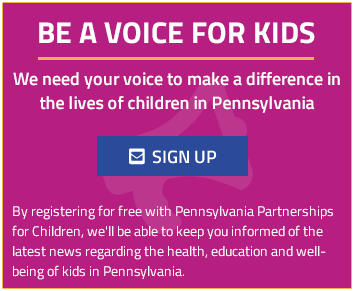Latest News
Despite uncertainties during Medicaid unwinding, Pa. kids largely stay insured, study finds
As families scrambled to re-enroll in Medicaid for the first time since the pandemic, new data shows that Pennsylvania’s rate of uninsured children has remained stable. A new report, released by the statewide children’s advocacy group Pennsylvania Partnerships for Children, analyzed Census data on children’s health insurance to provide an early look at the impact of […]
Impact of Trump’s proposed budget cuts cited for Pennsylvanians
As President-elect Donald Trump takes office, federal safety net programs such as Medicaid, CHIP and SNAP, which support 85 million low-income Americans, may face cuts to reduce inflation and debt. In Pennsylvania, 40% of the child population is covered through Medicaid. Carolyn Myers, communications director for Pennsylvania Partnerships for Children, said Medicaid has been instrumental in reducing the child uninsured rate. […]















PAP4Children Follow 9,953 2,620
Pennsylvania Partnerships for Children is dedicated to improving the well-being of PA's 2.6 million kids. We're independent, non-partisan and non-profit.
We're totally FALL-ing in love with this 🎃! #iamprek
Today is the last day to register to vote or update your voter info. Register to vote and check out these other important dates!
🗓️ Oct. 21 - Voter registration deadline
🗓️ Oct. 29 - Last day to apply for a mail ballot
🗳️ Nov. 5 - Election Day. Polls are open from 7 AM to 8 PM
In the clurb we all fam*
*and by clurb we mean our newsletter: https://bit.ly/BeAVoiceForKidsToday
In its latest report, Pennsylvania Partnerships for Children found that under half of eligible 3- and 4-year-olds participate in publicly funded Pre-K, affecting more than 78,000 children - via @PittsburghPG and @byjnanderson
🔗 :
Child care shortage threatens Pennsylvania's economy, new report argues
A historic child care crisis is leaving thousands of Pennsylvania kids without access to critical early learning pro...
ow.ly